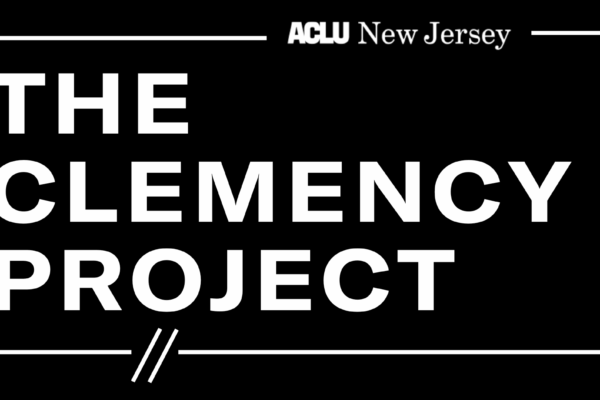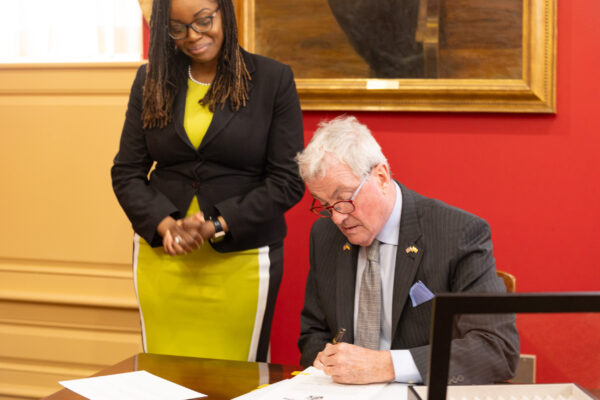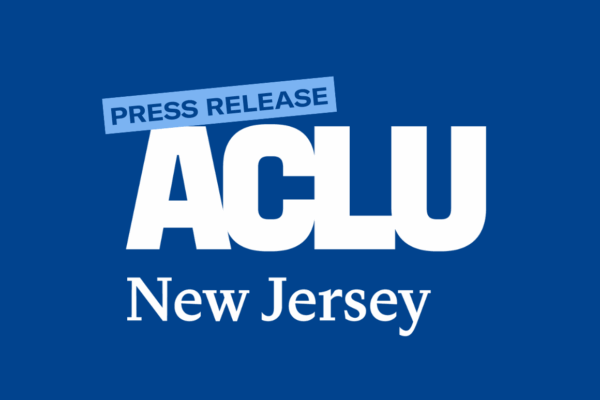The ACLU of New Jersey celebrates Governor Murphy’s announcement today of 36 pardons and 19 commutations as part of his commitment to categorical clemency. Four of the ACLU-NJ's clients were granted clemency and will have their sentences commuted: Kenneth Bacon-Vaughters, Lamar Alford, Anthony Dudley, and Adrian Miller.
The ACLU-NJ established The Clemency Project in 2024 to encourage Governor Murphy and future governors to use categorical clemency to examine holistic injustices that have impacted groups of people and consider relief for each person within the identified class. Today’s announcement marks 283 people granted clemency under Governor Murphy – more than previous governors have granted in the past thirty years combined.
“By embracing categorical clemency, Governor Murphy is changing lives and New Jersey for the better,” said ACLU-NJ Executive Director Amol Sinha. “He has demonstrated the power of compassion and is making historic decisions that are not only bettering our state, but society as a whole. We’re grateful for Governor Murphy’s commitment to decarceration and hope he continues to grant clemency until the end of his term. There is no time to lose – building an equitable future means addressing injustice now.”
Through The Clemency Project, the ACLU-NJ has represented 90 people, many still currently incarcerated and petitioning for a commutation. Most clients are survivors of domestic violence or serving sentences impacted by extreme trial penalties – a reference to people who are serving significantly longer sentences because they opted to exercise their constitutional right to a trial rather than agreeing to a prosecutor’s plea offer.
Today’s grants include clients who were also represented by the ACLU-NJ’s partners Princeton University and Rutgers University–Camden. Lawyers and students met with incarcerated people, reviewed case files, and authored petitions for release for those with lived experience in the identified categories.
“What was once a distant dream is now a reality for those granted clemency,” said ACLU-NJ Director of The Clemency Project Rebecca Uwakwe. “The cheers, tears of joy, and the overwhelming sense of hope that follows each grant remind us why this work must continue. People are redeemable, and every act of clemency proves it.”
The following statements are from ACLU-NJ clients who were granted clemency today:
Mr. Bacon-Vaughters was arrested at 18 years old on a felony murder robbery charge and was sentenced to 40 years. He will be released on parole. “I want to be a public speaker for at-risk youth upon my release. I hope that my story can aid them in their journeys to create positive change in their communities by showing if I can do it, they can too,” said Kenneth Bacon-Vaughters.
Mr. Dudley rejected a plea deal of 20 years to run concurrently with his first sentence for armed robbery. Instead, he chose to exercise his right to trial and was sentenced to an aggregate term of 100 years. After serving 25 years, he will be released on parole. “Thank you to Governor Murphy for seeing the worth in people and offering opportunities for second chances to those who never thought there was any chance,” said Anthony Dudley.
Mr. Alford was sentenced to life in prison for murder charges after exercising his right to trial. He had previously declined a plea offer of 25 years before going to trial. His sentence was commuted to 25 years. “I am looking forward to being reunited with my family, friends, and loved ones,” said Lamar Alford.
Exercising his right to trial after declining a 20-year plea offer, Mr. Miller was sentenced to 35 years for a robbery conviction. He will be released on parole. “I’m grateful for this chance to be a productive member of society and use my God-given talents to benefit my loved ones and others around me. I can be an asset to those who may not see the value in themselves,” said Adrian Miller.
Related Content

The Clemency Project

Pardons Change Lives – Categorical Clemency Proves New Jersey’s Commitment to Racial Justice and Rehabilitation

Clemency is More Than Mercy – It's Freedom

ACLU-NJ Celebrates Third Round of Releases Under The Clemency Project
Stay Informed
Sign up to be the first to hear about how to take action.
By completing this form, I agree to receive occasional emails per the terms of the ACLU’s privacy statement.
By completing this form, I agree to receive occasional emails per the terms of the ACLU’s privacy statement.
